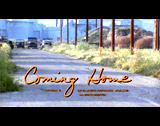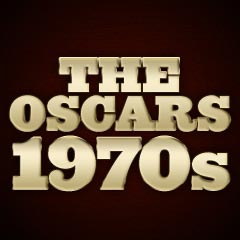|
1978
The winner is listed first, in CAPITAL letters.
|
Best Picture
|

|

|

|

|

|
|
THE DEER HUNTER (1978)
|
Coming Home (1978)
|
Heaven Can Wait (1978)
|
Midnight Express (1978)
|
An Unmarried Woman (1978)
|
Actor:
JON VOIGHT in "Coming Home", Warren Beatty in "Heaven
Can Wait", Gary Busey in "The Buddy Holly Story",
Robert De Niro in "The Deer Hunter",
Laurence Olivier in "The Boys From Brazil"
Actress:
JANE FONDA in "Coming Home", Ingrid Bergman in "Autumn
Sonata", Ellen Burstyn in "Same Time, Next Year",
Jill Clayburgh in "An Unmarried Woman", Geraldine Page
in "Interiors"
Supporting Actor:
CHRISTOPHER WALKEN in "The Deer Hunter",
Bruce Dern in "Coming Home", Richard Farnsworth in "Comes
a Horseman", John Hurt in
"Midnight Express", Jack Warden in "Heaven Can
Wait"
Supporting Actress:
MAGGIE SMITH in "California Suite", Dyan Cannon in "Heaven
Can Wait", Penelope Milford in "Coming Home",
Maureen Stapleton in "Interiors", Meryl Streep in "The
Deer Hunter"
Director:
MICHAEL CIMINO for "The Deer Hunter",
Woody Allen for "Interiors", Hal Ashby for "Coming
Home", Warren Beatty and Buck Henry for
"Heaven Can Wait", Alan Parker for "Midnight Express"
 Two
of the three front-runners in the 1978 awards race were anti-war
films that reflected the nation's divided attitudes toward
the war. Both films were set in the year 1968, though they
differed in their filmatic style and political stance. [Coppola's
Vietnam treatise Apocalypse Now (1979) was
delayed in its release, thereby leaving Cimino's war film to
take top honors in 1978]: Two
of the three front-runners in the 1978 awards race were anti-war
films that reflected the nation's divided attitudes toward
the war. Both films were set in the year 1968, though they
differed in their filmatic style and political stance. [Coppola's
Vietnam treatise Apocalypse Now (1979) was
delayed in its release, thereby leaving Cimino's war film to
take top honors in 1978]:
- younger generation producer/director Michael
Cimino's second film - the grandiose The
Deer Hunter (with nine nominations and five wins
- Best Picture, Best Supporting Actor, Best Director, Best
Sound, and Best Film Editing), the gripping drama about how
the violence of war permanently altered the lives of three
Pennsylvania steel-working and hunting friends who served
in Vietnam and were forced to play Russian Roulette by the
Vietcong; the meteoric rise of Cimino as a result of this
film was soon dashed by the financial disaster of his next
film, Heaven's Gate (1980)
- Hal Ashby's more left-wing, anti-Vietnam war
film Coming Home (with eight nominations and three
wins - Best Actor, Best Actress, and Best Original Screenplay).
It told about the sorrowing effects of the Vietnam War on
the homefront, and won the major acting awards. The film
was produced by actress Jane Fonda's new film production
company
The other three Best Picture nominees were:
- Warren Beatty and Buck Henry's comedy remake
of Here Comes Mr. Jordan (1941), with a film titled Heaven
Can Wait (with nine nominations, tying the winner with
the most nominations, and only one win - Best Art/Set Direction)
- director Alan Parker's Midnight Express (with
six nominations and two wins - Best Screenplay Adaptation
by Oliver Stone (his first nomination and first win), and
Best Score by Giorgio Moroder, with its hit tune "Chase"),
the true, graphic story of Billy Hayes (played by an un-nominated
Brad Davis) and his brutalized ordeal in a Turkish prison
for a drug smuggling offense
- Paul Mazursky's early feminist film An
Unmarried Woman (with three nominations and no wins),
the story of the consequences of a shattered marriage of
seventeen years for a betrayed wife who must deal with
the changes
Mazursky was the only director of a Best
Picture nominee who was not included in the Best Director
nominees. His place was taken by Woody Allen for his serious,
cold tribute to Ingmar Bergman with a film about a fragmenting
family of three neurotic adult sisters, Interiors (with
five nominations and no wins). Co-directors Warren Beatty and
Buck Henry (with their directing debuts) of Heaven Can Wait were
the first dual nominees for Best Director since Robert
Wise and Jerome Robbins were nominated (and won) for  West
Side Story (1961). West
Side Story (1961).
The individuals caught in a Vietnam war-tangled
romance in the melodramatic Coming Home were nominated
in lead and supporting acting categories. The four nominations,
one in each of the acting categories, made Coming Home one
of about a dozen films in Oscar history with the same distinction:
- Jon Voight (with his second nomination and first Oscar)
won the Best Actor award for his role as Luke Martin - a
bitter but sensitive paraplegic veteran paralyzed from the
Vietnam war. He falls in love with a volunteer rehabilitation
hospital worker (Jane Fonda) and chains himself to the Marines
recruiting center when his buddy commits suicide
- Jane Fonda (with her fourth nomination and second Oscar
win), a controversial activist and anti-war protestor,
won the Best Actress award as Sally Hyde - the bored
middle-class wife of chauvinistic Marine officer Capt. Bob
Hyde (Bruce Dern), who volunteers in a Vietnam veterans hospital
where she meets a disabled Voight and eventually becomes
his romantic partner
- Bruce Dern (with his first of two career
nominations) was nominated in the Best Supporting Actor
category as returning gung-ho, wounded Marine officer Captain
Bob Hyde, Fonda's husband (Note: Dern was nominated 35
years later as Best Actor for Nebraska (2013))
- Penelope Milford (with her sole nomination)
was also nominated in the Best Supporting Actress category
for her role as Viola Munson - Fonda's friend and co-volunteer
in the veteran's hospital
In the other anti-Vietnamese war film of the
year, two of the three Pennsylvania steelworkers who went off
to the Vietnam War in the documentary style The
Deer Hunter were nominated or won acting awards:
- Robert De Niro (with his second Best Actor
nomination in the role of a Vietnam-era veteran) was nominated
as Best Actor for his role as Michael Vronsky - an ace deer
hunter who is brutalized by his experiences in Vietnam
- Christopher Walken (with his first nomination)
won the Best Supporting Actor award for his performance as
a disintegrating, war-scarred Nikanor ('Nick') Chevotarevich
who carries on with the suicidal Russian Roulette gambling
games in Vietnam
- Meryl Streep (with her first nomination
in her second film role) was also nominated as Best Supporting
Actress for playing Robert De Niro's girlfriend Linda in
a small role
The remaining Best Actor nominees included the
following:
- Warren Beatty (with his second acting nomination)
as Los Angeles Rams quarterback Joe Pendleton who died and
went to heaven prematurely in Heaven Can Wait. [Beatty's
nomination made him only the second Oscar nominee
to receive simultaneous nominations in four categories: Best
Picture producer, Best Actor, Best Director (shared with
Buck Henry), and Best Screenplay (shared with Elaine May).
He lost in all four categories too. The other nominee was
Orson Welles for
 Citizen
Kane (1941). Beatty also became the fifth person
in Oscar history to be nominated in a single year as both
an actor and screenwriter. Others before were Charlie Chaplin
-1940-, Orson Welles -1941-, Sylvester Stallone -1976-, and
Woody Allen -1977. Beatty repeated this same feat in 1981
for writing and acting in Reds.] Citizen
Kane (1941). Beatty also became the fifth person
in Oscar history to be nominated in a single year as both
an actor and screenwriter. Others before were Charlie Chaplin
-1940-, Orson Welles -1941-, Sylvester Stallone -1976-, and
Woody Allen -1977. Beatty repeated this same feat in 1981
for writing and acting in Reds.]
- Gary Busey (with his sole career nomination)
as the title character in the rock and roll bio in director
Steve Rash's The Buddy Holly Story (with three nominations
and one win - Best Original Song Score) about the legendary,
1950s pioneering singer with the Crickets who prematurely
died in a tragic plane crash; Busey sang his own tracks in
the amazing impersonation
- Laurence Olivier (with his tenth and last career
nomination) was nominated for his role as fictional Nazi
hunter Ezra Lieberman (based on real-life Simon Wiesenthal)
in pursuit of his Nazi target - geneticist Josef Mengele
(Gregory Peck) in director Franklin Schaffner's compelling The
Boys From Brazil (with three nominations and no wins).
[Olivier's previous nomination was for a reverse portrayal
- as an evil Nazi in Marathon Man
(1976).]
The remaining Best Actress nominees were:
- Ingrid Bergman (with her seventh and last
career nomination and in her final film performance)
as concert pianist Charlotte in director Ingmar Bergman's
talkative Swedish film (with English subtitles) of a mother-daughter
conflict, Autumn Sonata (with two nominations and
no wins)
- Ellen Burstyn (with her fourth nomination)
as Doris - a young California housewife - and one of two
married strangers (the other is accountant Alan Alda) who
meet only one weekend each year for a twenty-five year period
in Robert Mulligan's Same Time Next Year, the filmed
version of the popular play
- Jill Clayburgh (with her first of two unsuccessful
and consecutive nominations) in the title role as Erica Benton
- a Manhattan art gallery worker who is deserted in her marriage
in An Unmarried Woman
- Geraldine Page (with her sixth unsuccessful
nomination) as the mentally-disturbed, depressively-suicidal
mother Eve who spiraled downward when her husband Arthur
(E.G. Marshall) asked for a separation, in Woody Allen's
starkly unfunny Interiors
The remaining Best Supporting Actor nominees
included:
- ex-stuntman Richard Farnsworth (with his first
of two career nominations) as ranch foreman Dodger in Alan
J. Pakula's western drama Comes a Horseman (the film's
sole nomination)
- John Hurt (with his first nomination) as an
Englishman named Max - one of Billy Hayes' fellow inmates
tortured in a Turkish jail in Midnight Express
- Jack Warden (with his second of two unsuccessful
career nominations) as Max Corkle - Joe Pendleton's puzzled
football coach/trainer in Heaven Can Wait
The victor in the Best Supporting Actress category
was English actress Maggie Smith (with her fourth nomination
- and with her second Oscar win) for her role as Diana
Barrie - a neurotic, bitchy, hard-drinking and fussy Oscar-nominated
British actress waiting for the Oscar awards night in Hollywood
and being helped to dress by bi-sexual husband Michael Caine
in director Herbert Ross' film California Suite (with
three nominations and one win - Best Supporting Actress). Curiously,
Smith won her Oscar for the role of an Oscar-loser. She became
the only performer to win an Academy Award for playing an actor
who lost at the Academy Awards. This was Neil Simon's version
of Grand Hotel (1932) - and
an attempted rewrite of Plaza Suite (1971) in a California
setting.
The remaining Best Supporting Actress nominees
were:
- Dyan Cannon (with her second of two unsuccessful
career nominations) as Julia Farnsworth - an unfaithful,
adulterous and murderous wife who can't successfully kill
her husband (Warren Beatty) in Heaven Can Wait
- Maureen Stapleton (with her third of
four unsuccessful Best Supporting Actress career nominations)
as Arthur's (E.G. Marshall) replacement wife Pearl, in Interiors
Sir Laurence Olivier was presented with an Honorary
Award this year "for the full body of his work, for his
unique achievements of his entire career and his lifetime of
contribution to the art of film." He had won only one
competitive Oscar award in his career (for Best Actor for Hamlet
(1948)), received eight other Best Actor nominations (stretching
from 1939 to 1978), and one Best Supporting Actor nomination
(in 1976). He was also nominated as Best Director for Hamlet
(1948) - and became the only performer in Oscar
history to direct himself (and act) in an Academy Award-winning
performance. Legendary animator/cartoonist Walter Lantz, creator
of Woody Woodpecker, received an Honorary Academy Award in
1979 (at the ceremony honoring films of 1978) for "bringing
joy and laughter to every part of the world through his unique
animated motion pictures." The award was "presented" by
Lantz's most famous creation, Woody Woodpecker, using combined
live-action and animation.
For the first time in Oscar history, all
of the nominated songs in the Best Original Song category were
sung by their original performers:
- "Hopelessly Devoted to You" from Grease -
Olivia Newton-John
- "The Last Time I Felt Like This" from Same
Time, Next Year - Johnny Mathis with Jane Olivor
- "Last Dance" from the forgettable
film Thank God It's Friday - Donna Summer - THE WINNER
- "When You're Loved" from The
Magic of Lassie - Debby Boone
- "Ready to Take a Chance Again" from Foul
Play - Barry Manilow
Scared Straight!, narrated by
Peter Falk, won the Oscar for Best Documentary - Features,
for its graphic portrayal of Rahway (NJ) State Prison's "Lifer's
Program" - to deter juvenile delinquents from a life of
crime.
Oscar Snubs and Omissions:
Overshadowed as Best Picture nominees in the
year of The Deer Hunter were
Ted Post's anti-Vietnam war film Go Tell the Spartans with
Burt Lancaster as Major Asa Barker in a marvelous performance,
and writer/director Woody Allen's somber, Ingmar-Bergmanesque Interiors.
Ingmar Bergman's adult-drama Autumn Sonata was nominated
only twice: for Best Actress (Ingrid Bergman) and Best Original
Screenplay (Ingmar Bergman), but not for Liv Ullman's performance
as Eva, or for Bergman's direction.
Brad Davis was ignored for his role as Turkish
prison inmate Billy Hayes in the much-praised Midnight Express as
was John Belushi for the year's third-biggest moneymaker Animal
House (with no nominations). Tim McIntire's remarkable
performance as pioneering rock DJ Alan Freed in Floyd Mutrux's American
Hot Wax was un-nominated. Dustin Hoffman was not among
the nominees for his role as violent and explosive ex-convict/thief
Max Dembo trying to go 'straight' in Straight Time.
And John Savage was overlooked for his quiet yet intense role
in The Deer Hunter. Stand-up
comedian Richard Pryor (in his sole dramatic film role) was
snubbed for his performance as struggling and desperate blue-collar
worker Zeke Brown in a mismanaged, corrupt and miserable Detroit
auto-factory, opposite performances by his friends Jerry (Harvey
Keitel) and Smokey (Yaphet Kotto), in Paul Schrader's (his
directorial debut) political labor film Blue Collar.
And Melanie Mayron was also un-nominated for her performance
as married Jewish woman/photographer Susan Weinblatt in Claudia
Weill's debut film Girlfriends.
To make up for the glaring omission (and avoid
further criticism) by ignoring the BeeGee's soundtrack of Saturday
Night Fever (1977) the year before, the Academy awarded
a Best Song Oscar ("Last Dance") to an inferior disco
film, Thank God It's Friday (1978), featuring Donna
Summer's film debut. The win for the film's signature tune
beat out Grease's sole nominee: "Hopelessly Devoted
to You," and probably further denied other Grease songs
from being nominated (i.e., "You're the One That I Want," or
the title song "Grease"). Also, Leonard Rosenman's
Golden Globe-nominated stirring score for Ralph Bakshi's animated
feature The Lord of the Rings was overlooked.
The year's biggest blockbuster, Grease was
entirely overlooked in many potential nomination categories:
Best Picture, Best Director (Randal Kleiser), Best Actor and
Actress (John Travolta and Olivia Newton-John), Best Supporting
Actress (Stockard Channing), Best Adapted Screenplay (Allan
Carr), and Best Original Song Score (John Farrar). The classic
whodunit Death on the Nile (which won its
sole nomination for Best Costume Design) was also seriously
overlooked in acting nominations amongst its star-studded cast,
including Peter Ustinov for Best Actor for his first rendition
of Agatha Christie's famously fussy Belgian sleuth Hercule
Poirot, and supporting nods for Angela Lansbury as eccentric
trashy novelist Salome Otterbourne and Maggie Smith as an elderly
socialite's cynical traveling companion named Miss Bowers,
as well as famed cinematographer Jack Cardiff's stunning on-location
work in Egypt. |

![]()